Description
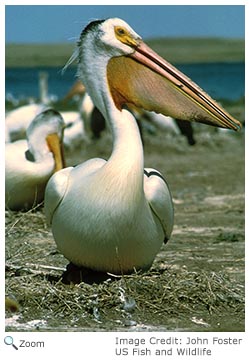 The American white pelican is about four feet tall and has a wingspan of around nine feet. It is entirely white except for its black-edged wings that are visible when it is in flight. It has a long neck, a long orange bill with an expandable pouch, and short orange legs with big webbed feet. The American white pelican is about four feet tall and has a wingspan of around nine feet. It is entirely white except for its black-edged wings that are visible when it is in flight. It has a long neck, a long orange bill with an expandable pouch, and short orange legs with big webbed feet.
In breeding season, it has a light yellowish crest on the back of its head and a nuptial tubercle or fibrous plate on the upper part of its bill. The nuptial tubercle falls off when mating season is over and the crest turns gray. Young American white pelicans have grayish markings on their heads and backs.
Range 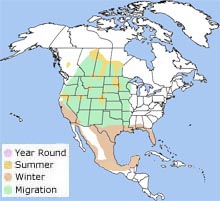 The American white pelican breeds in isolated areas from Manitoba, Canada and Minnesota west to northern California. The American white pelican migrates to its winter grounds in early fall. It winters in California, Mexico, Central America, along the Gulf Coast, and in Florida. The American white pelican breeds in isolated areas from Manitoba, Canada and Minnesota west to northern California. The American white pelican migrates to its winter grounds in early fall. It winters in California, Mexico, Central America, along the Gulf Coast, and in Florida.
Habitat
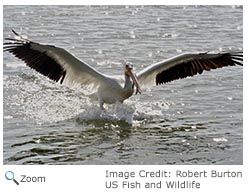 The American white pelican lives on inland shallow freshwater lakes, wet prairies, and marshes in the summer and on coastal lagoons in the winter. The American white pelican lives on inland shallow freshwater lakes, wet prairies, and marshes in the summer and on coastal lagoons in the winter.
|
|
|
Diet 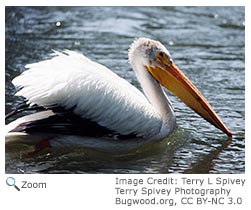 The American white pelican doesn't dive into the water for its food like the brown pelican. It floats on the water and scoops up fish and water in its pouch. It holds its head up and drains out the water and then swallows the fish. It only carries food in its pouch when it is taking food to its chick. The American white pelican doesn't dive into the water for its food like the brown pelican. It floats on the water and scoops up fish and water in its pouch. It holds its head up and drains out the water and then swallows the fish. It only carries food in its pouch when it is taking food to its chick.
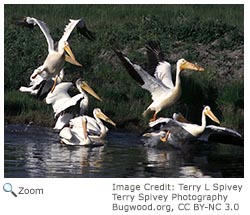 American white pelicans often hunt for food in groups. They form a line and start swimming towards shore while flapping their wings and herding their prey towards the shore. Sometimes, one group of pelicans will even drive the prey towards another group of pelicans! The American white pelican eats up to three pounds of fish per day. It also eats salamanders and crayfish. American white pelicans often hunt for food in groups. They form a line and start swimming towards shore while flapping their wings and herding their prey towards the shore. Sometimes, one group of pelicans will even drive the prey towards another group of pelicans! The American white pelican eats up to three pounds of fish per day. It also eats salamanders and crayfish.
Life Cycle
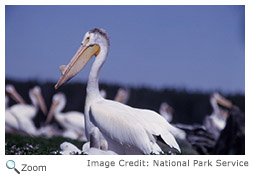 The American white pelican nests in colonies. Male and female American white pelicans show off their bright orange bills during courtship. They strut around, bow, and take short flights in an attempt to attract a mate. The American white pelican nests in colonies. Male and female American white pelicans show off their bright orange bills during courtship. They strut around, bow, and take short flights in an attempt to attract a mate.
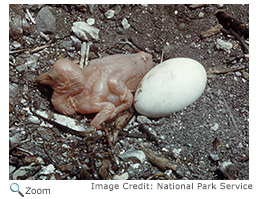 The female lays 1-3 eggs in a depression on the ground or on a mound of vegetation and dirt. Both parents incubate the eggs with their large webbed feet! The eggs hatch in about a month. If the female lays more than one egg, usually only the strongest chick survives. The other chicks die of starvation because they can't compete for food with their stronger sibling. The female lays 1-3 eggs in a depression on the ground or on a mound of vegetation and dirt. Both parents incubate the eggs with their large webbed feet! The eggs hatch in about a month. If the female lays more than one egg, usually only the strongest chick survives. The other chicks die of starvation because they can't compete for food with their stronger sibling.
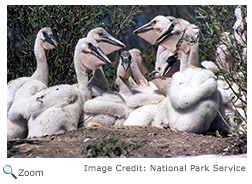 Chicks are naked at birth. By the time they are 10 days old they are covered with white down. Both parents care for the young. The chicks dig regurgitated food out of their parents pouches. Chicks leave the nest and join the a pod or a crèche of young pelicans when they are 17-28 days old. Chicks fledge when they are about 10 weeks old. Chicks are naked at birth. By the time they are 10 days old they are covered with white down. Both parents care for the young. The chicks dig regurgitated food out of their parents pouches. Chicks leave the nest and join the a pod or a crèche of young pelicans when they are 17-28 days old. Chicks fledge when they are about 10 weeks old.
Behavior 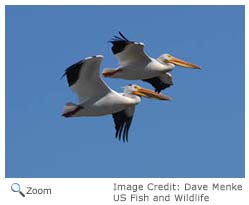 The American white pelican is clumsy on land, but it is a good swimmer and very graceful in flight. American white pelicans fly in flocks in a long line, with their necks bent back over their bodies. The American white pelican is clumsy on land, but it is a good swimmer and very graceful in flight. American white pelicans fly in flocks in a long line, with their necks bent back over their bodies.
|

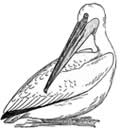

 The American white pelican breeds in isolated areas from Manitoba, Canada and Minnesota west to northern California. The American white pelican migrates to its winter grounds in early fall. It winters in California, Mexico, Central America, along the Gulf Coast, and in Florida.
The American white pelican breeds in isolated areas from Manitoba, Canada and Minnesota west to northern California. The American white pelican migrates to its winter grounds in early fall. It winters in California, Mexico, Central America, along the Gulf Coast, and in Florida.





